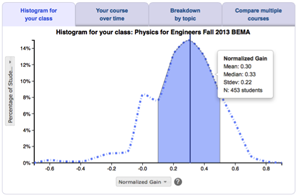
Developed by: FACET Innovations








middle schoolhigh schoolintro collegeinter-mediateupper levelgrad school other

calc based

alg based

conceptual










Overview
What? Learning goals and tools for eliciting students' initial ideas, facets of learners' thinking with respect to learning goals and common misconceptions (problematic ideas,) lessons to engage students' ideas, assessment items, and reporting structures for students and teachers.
Why? Because the tasks are short and independent of one another, they are easy to try out without making significant alterations to your course. They are constructed to be the right "step size" so that students feel comfortable responding to them using their natural ideas rather than memorized physics.
Why not? Diagnoser Tools were designed for use in high school classrooms. While appropriate for college-level conceptual physics, they may be less useful in a more rigorous course.
Student skills developed
- Conceptual understanding
- Problem-solving skills
- Making real-world connections
- Using multiple representations
- Designing experiments
- Metacognition
Instructor effort required
- Medium
Resources required
- Computers for students
Resources
Teaching Materials
You can access the Diagnoser Tools for free by registering with the Diagnoser website.
Research
This is the second highest level of research validation, corresponding to:
- at least 1 of the "based on" categories
- at least 2 of the "demonstrated to improve" categories
- at least 4 of the "studied using" categories
Research Validation Summary
Based on Research Into:
- theories of how students learn
- student ideas about specific topics
Demonstrated to Improve:
- conceptual understanding
- problem-solving skills
- lab skills
- beliefs and attitudes
- attendance
- retention of students
- success of underrepresented groups
- performance in subsequent classes
Studied using:
- cycle of research and redevelopment
- student interviews
- classroom observations
- analysis of written work
- research at multiple institutions
- research by multiple groups
- peer-reviewed publication
References
- P. Kraus and J. Minstrell, Designing Diagnostic Assessments, presented at the Physics Education Research Conference 2002, Boise, Idaho, 2002.




